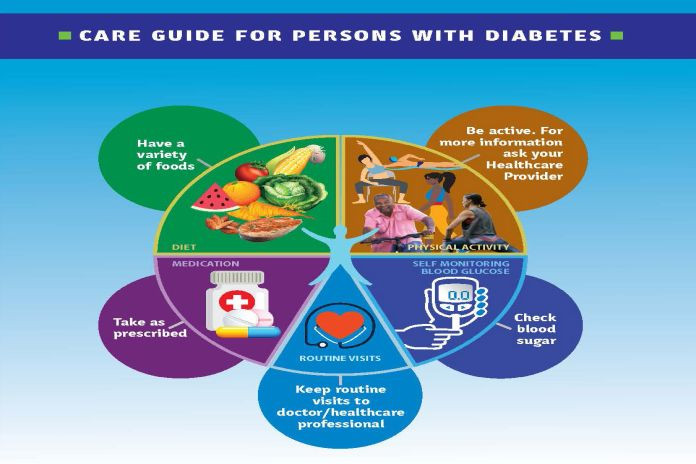PORT OF SPAIN, Trinidad, (CARPHA) – Non-communicable diseases (NCDs) remain the leading causes of mortality, morbidity, and disability in the Caribbean region, imposing a high economic burden. One of the most common non-communicable diseases is diabetes. For Persons Living with Diabetes (all types), the disease can be effectively managed with a regimen of drug therapy and lifestyle modification, inclusive of nutrition therapy and exercise prescription. Type 2 diabetes can be prevented by addressing the modifiable risk factors through adopting healthy lifestyle practices.
On Tuesday 13 June 2023, the Caribbean Public Health Agency (CARPHA) hosted a webinar to launch and advocate for the standardised use of the Diabetes Nutritional Management Toolkit for the Caribbean developed to support the dissemination of the CARPHA Guidelines for the Management of Diabetes in Primary Care in the Caribbean. The launch of the Diabetes Nutritional Management Toolkit was held as part of CARPHA’s celebration of Caribbean Nutrition Awareness Month 2023.
Dr Joy St John, executive director of CARPHA, speaking at the webinar to launch the toolkit, stated:
“In the CARICOM region, we are in a battle with the scourge of this NCD disease burden because we are what we eat. The epidemiology has not improved, and several of our sister islands are classified as having the highest NCD prevalence in the Americas. As NCDs are the leading causes of premature mortality, morbidity, and disability in the Caribbean region, there is also a high economic burden and the countries are less productive. Our children are overweight, obese and primed to develop diabetes and hypertension earlier than previous populations. Even worse, we watched as COVID-19 seemed to target those among us with diabetes and hypertension for severe illness and death.”
CARPHA developed a Diabetes Nutritional Management Toolkit to support the implementation of the nutrition component of the CARPHA Guidelines for the Management of Diabetes in Primary Care in the Caribbean. The tools were developed using the guidelines and current evidence on what works from the literature and consultations with nutrition and dietetic experts and other professionals in the region.
The toolkit, consisting of nutritional support tools for health care professionals and persons living with diabetes and their caregivers, was developed as part of the Agence Française de Développement (AFD) -funded project “Strengthening Strategic Intelligence and Partnership Approaches to Prevent and Control NCDs and Strengthen Regional Health Security in the Caribbean.”
Camille Guigonnet, AFD project officer and regional communication manager, delivered remarks on behalf of Marc Dubernet, AFD regional director for the Atlantic Ocean.
“The Project has enabled CARPHA to develop knowledge and decision-making tools in the field of non – communicable diseases, particularly overload pathologies such as diabetes, which brings us together today. The different nutritional guides for persons living with diabetes or health care professionals designed in the framework of the CARPHA and AFD project are tangible evidence of our successful partnership. Not only will they contribute to counsel and provide nutrition services to persons with diabetes but will also deliver new efficient management tools for dietetic experts and other professionals in the region.”
Dr Gloria Giraldo, advisor, noncommunicable diseases and mental health, Pan American Health Organization (PAHO/WHO), stated:
“The NCD crisis affecting our Region makes this training both timely and critical. Among the countries with the highest age-standardised death rates due to diabetes, 5 among the top seven are from the Caribbean. Tackling NCDs in our region is a major challenge and part of the solution lies in effective collaboration like we are doing today – training and effective evidence-based guidelines like CARPHA has developed. The momentum gained by leading organisations such as CARPHA, with the support of partners such as the AFD, as well as academics and practitioners have resulted in the important Diabetes Nutritional Management Toolkit that is being launched today. The launch of the toolkit aligns very well with the WHO Global Diabetes Compact and our regional PAHO implementation of the compact.”
The practical toolkit is made up of six regional products. Nutritional Management for Persons Living with Diabetes.
Health Care Professionals Guide is aimed specifically at healthcare professionals involved in the management of persons living with diabetes. The toolkit also includes downloadable resources for persons living with diabetes and their caregivers and healthcare professionals:
-
-
- Managing Diabetes Mellitus: Care Guide for Persons with Diabetes;
- Managing My Diabetes Poster;
- My Caribbean Plate Poster;
- Nutrition Labels Made Simple Poster, and
- Healthy Eating with Diabetes Brochure.
-
The toolkit is designed to be a support to all healthcare professionals involved in the management of diabetes in the Caribbean. It will help to address the challenge of limited human resources and lack of appropriate standardised support tools in providing services to persons with diabetes for them to effectively self-manage their conditions.
Attracting more than 500 participants, the webinar provided a detailed overview of the Process for the Development of the toolkit and highlighted the key findings from the Needs Assessment of Nutrition Services.
Attendees benefitted from presentations on Nutrition and NCDs in the Caribbean; an overview of the CARPHA Guidelines for the Management of Diabetes; and insights from some diabetes support groups in the Caribbean.
The Diabetes Nutritional Management Toolkit can be accessed on the CARPHA website.
Presenters included Dr Fabio Gomes, advisor, nutrition and physical activity, Pan American Health Organization (PAHO/WHO); Maisha Hutton, executive director, Healthy Caribbean Coalition (HCC); Dr Heather Armstrong, head, chronic diseases and injury department, CARPHA; and Abigail Caleb, senior technical officer, food security and nutrition, CARPHA.





